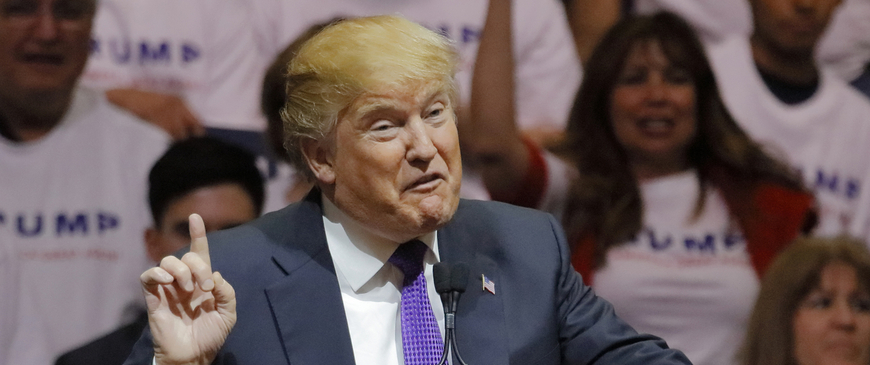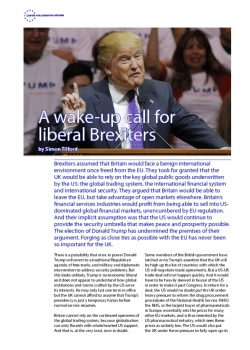
A wake-up call for liberal Brexiters
Trump's win has further weakened the liberal case for Brexit. Forging the closest EU ties possible is now even more essential for Britain.
Brexiters assumed that Britain would face a benign international environment once freed from the EU. They took for granted that the UK would be able to rely on the key global public goods underwritten by the US: the global trading system, the international financial system and international security. They argued that Britain would be able to leave the EU, but take advantage of open markets elsewhere. Britain’s financial services industries would profit from being able to sell into US dominated global financial markets, unencumbered by EU regulation. And their implicit assumption was that the US would continue to provide the security umbrella that makes peace and prosperity possible. The election of Donald Trump has undermined the premises of their argument. Forging as close ties as possible with the EU has never been so important for the UK.
There is a possibility that once in power Donald Trump will revert to a traditional Republican agenda of free-trade, and military and diplomatic intervention to address security problems. But this looks unlikely. Trump is no economic liberal and does not appear to understand how global institutions and norms crafted by the US serve its interests. He may only last one term in office but the UK cannot afford to assume that Trump’s presidency is just a temporary hiatus before normal service resumes.
Britain cannot rely on the continued openness of the global trading system, because globalisation can only flourish with wholehearted US support. And that is, at the very least, now in doubt.
Some members of the British government have latched on to Trump’s assertion that the UK will be high up the list of countries with which the US will negotiate trade agreements. But a US-UK trade deal will not happen quickly. And it would have to be heavily skewed in favour of the US in order to make it past Congress. In return for a deal, the US would no doubt put the UK under heavy pressure to reform the drug procurement procedures of the National Health Service (NHS): the NHS, as the largest buyer of pharmaceuticals in Europe, essentially sets the prices for many other EU markets, and is thus resented by the US pharmaceutical industry, which sees these prices as unfairly low. The US would also put the UK under fierce pressure to fully open up its agricultural markets to US food exports. These conditions could, in turn, make a trade deal with the US unacceptable to British voters. Finally, the UK cannot be confident that Trump will continue to place much emphasis on close relations with Britain. Trump’s allegiance to Britain seems to rest more on emotion than on a clear-sighted assessment of US interests, and as such might not survive any disagreement between the US and the UK.
Trump’s victory should have brought home to British ministers that the UK cannot rely on the US providing the security needed to keep Europe peaceful and prosperous. While Trump will not call time on NATO as he threatened to do during his campaign, it is clear that the US will be a less reliable partner for Europe. A Trump administration will also take a much softer line with Russia, potentially destabilising Central and Eastern Europe and opening the way for increased Russian meddling in the EU. This is inimical to UK interests, as the country’s foreign minister, Boris Johnson, has made clear. Nor is the UK likely to have much in common with the Trump administration when it comes to the environment; Theresa May’s cabinet may contain a few climate change sceptics, but the government remains committed to reducing the UK’s carbon emissions and to international efforts to combat global warming.
#Trump’s win means forging as close ties as possible w. the EU has never been so crucial for Britain
Trump’s win demonstrates that engagement with the EU is the best way of defending the UK’s interests and upholding the liberalism many Brexiters claim to support. Indeed, it further heightens the case for Britain remaining in the EU. With globalisation under pressure, the benefits of single market membership are even clearer, especially for Britain’s cluster of financial and business services industries, whose success over the last 20 years has to a large extent been driven by EU trade, which they have come to dominate. A US less committed to the multilateral trading system also increases the importance of EU membership as a lever to open up markets around the world. Where might is right, the UK will be a supplicant in any significant trade negotiations. However, as EU membership is off the table, Britain needs to focus on delivering the closest possible relationship with the EU compatible with the referendum result.
Britain’s Conservative government should row back from the inflexible positions it has staked out on free movement and the remit of the European Court of Justice. This means accepting a compromise on free movement, if the EU offers one, rather than an end to it. And it means the continued supremacy of European law over UK law where it pertains to the single market, or those parts of the single market the UK remains a part of. Britain also needs to accept a greater role for the EU in providing for European security. Successive British governments have been deeply ambivalent about the EU assuming a bigger defence role, fearing that it would undermine NATO. But with the US’s commitment to NATO in doubt, the very least the UK needs to do is hedge its bets.
Trump’s victory gives the efforts to strengthen EU defence policy more urgency. The UK has a lot to offer in this field – UK backing for and participation in a strengthened EU defence capability could foster good will in other areas of negotiation. The UK should avoid confrontational haggling over defence and free movement, and maintain a strong commitment to the security of Central and Eastern Europe, regardless of the outcome of the Brexit negotiation. But constructive British engagement on European defence and security – which is in the UK interest in any case – would improve damaged relations with Germany and other member-states. In turn, this would make compromise on market access and free movement easier.
So far, the reaction of the British government to the US election result has been short-sighted and simplistic: Trump will be good for the ‘special relationship’ because he likes Britain and what is good for the special relationship is good for Britain. But close ties with the US are only in the UK’s interest if the US is committed to open trade and finance and the provision of a robust US military presence in Europe. There is little to suggest the UK will be able to mould a Trump-led America to its liking, and much to suggest that close ties to the Trump administration would further damage the UK’s standing with the EU.
The already weak case for Brexit just got a whole lot weaker. A clear-eyed analysis of UK interest suggests that the government should prioritise rebuilding relations with the EU as a matter of urgency. Liberal Brexiters should acknowledge that the world has changed and that their Brexit vision was predicated on foreign policy assumptions that are now very much in doubt.
Simon Tilford is deputy director of the Centre for European Reform.

